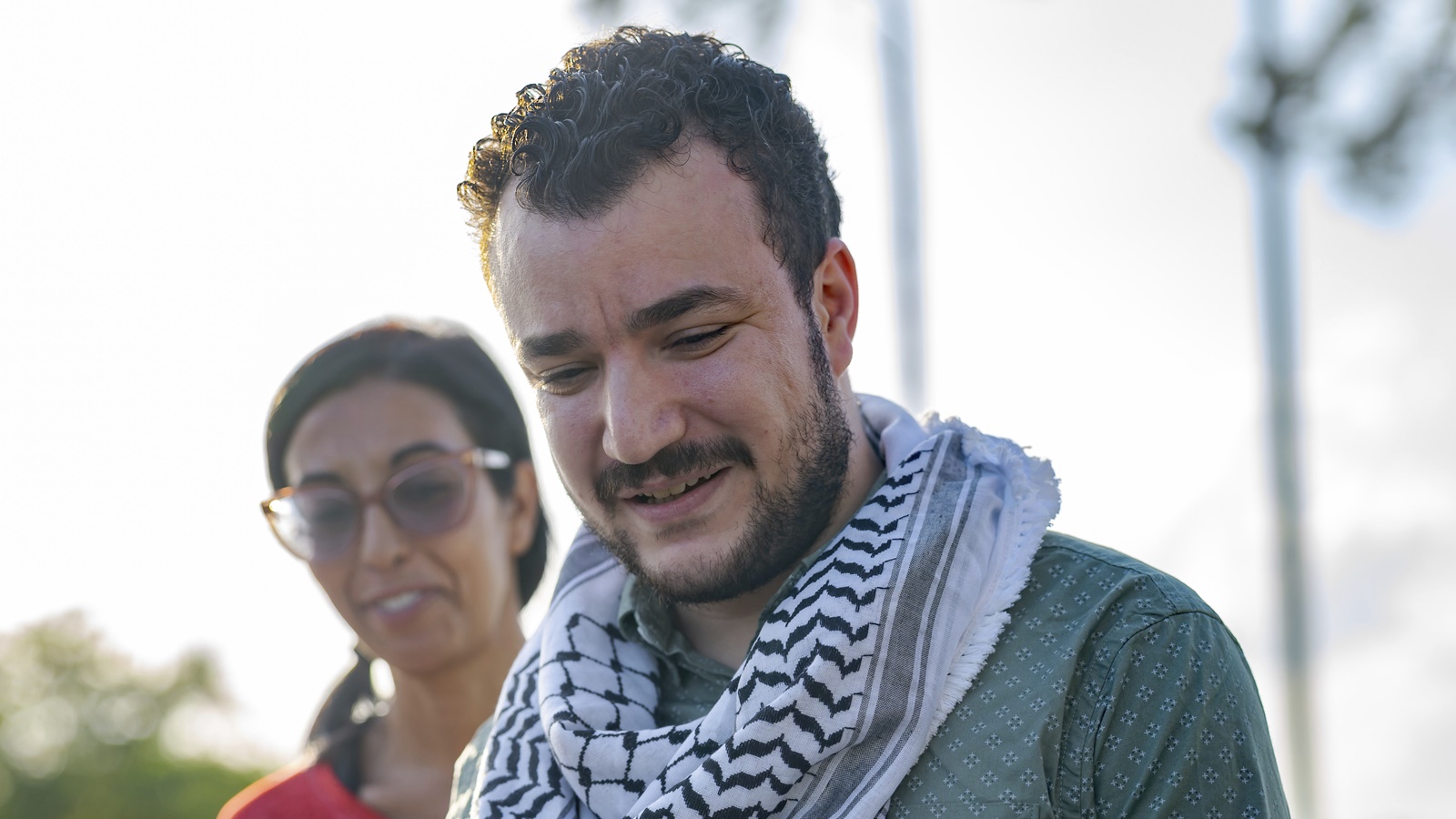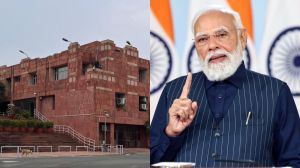Stay updated with the latest - Click here to follow us on Instagram
Who is Mahmoud Khalil? From double refugee to the face of a campus protest movement
Though a legal US resident with a green card, he was detained as the Trump administration sought to deport him, citing his participation in pro-Palestinian demonstrations and an alleged misrepresentation on his immigration forms, an accusation Khalil denies.
 Palestinian activist and former Columbia University graduate student Mahmoud Khalil, center, speaks after his release from federal immigration detention in Jena, La. (AP Photo)
Palestinian activist and former Columbia University graduate student Mahmoud Khalil, center, speaks after his release from federal immigration detention in Jena, La. (AP Photo)Mahmoud Khalil, the Columbia University student who was released after 104 days in federal immigration detention for protesting Israel’s actions in Gaza, had one message: “No human is illegal”.
In the debate over student activism, immigration, and free speech in the United States, one name has unexpectedly emerged: Mahmoud Khalil. The 29-year-old Palestinian activist, who once fled war-torn Syria as a teenager and later worked on peace and justice initiatives in the Middle East, is now the face of resistance against what civil liberties groups are calling a crackdown on campus dissent under US President Donald Trump.
Khalil walked free on Friday, released by a judge who criticised the government’s case against him as unjustified and politically motivated. “This shouldn’t have taken three months,” Khalil said as he stepped out of the remote Louisiana detention facility, finally on his way back to New York to reunite with his US citizen wife and newborn son, whom he had never met, as per The Guardian.
From Syria to now…
Born in Damascus in 1995 to Palestinian refugee parents, Khalil grew up with conflict as a constant backdrop. He was just 18 when he fled Syria during the civil war, eventually making his way to Lebanon. There, he taught himself English and worked with Syrian refugees while studying computer science, according to The Guardian. His journey then led him to jobs with the British Foreign Office and the UN agency for Palestinian refugees (UNRWA), before arriving in New York as a graduate student at Columbia University’s School of International and Public Affairs in 2023.
It was on that Ivy League campus that Khalil became a central figure in a student protest movement. As a lead negotiator for Columbia University Apartheid Divest (CUAD), he stood at the frontlines of efforts demanding the university divest from Israel over its war in Gaza. While many demonstrators wore masks to protect their identities, Khalil spoke openly on microphones, on camera, and in front of the media. To many, he became the voice of the encampment.
How did he get detained
Despite not being arrested at the protests, Khalil’s public visibility made him a target. On March 8, federal agents arrested him at his Manhattan apartment. Though a legal US resident with a green card, he was detained as the Trump administration sought to deport him, citing his participation in pro-Palestinian demonstrations and an alleged misrepresentation on his immigration forms, an accusation Khalil denies.
According to The Associated Press, US District Judge Michael Farbiarz, who ordered his release, criticised the government’s case, stating that Khalil posed no flight risk, was not a danger to the community, and had not been accused of any violence. “Period, full stop,” the judge said in court.
However, the Department of Homeland Security immediately pushed back, announcing plans to appeal the release. An immigration judge in Louisiana had, on the same day, issued a removal order, raising the possibility of a drawn-out legal battle ahead.
His wife, Dr Noor Abdalla, who gave birth while Khalil was detained, said the ordeal had been a nightmare. “We know this ruling does not begin to address the injustices… But today, we are celebrating Mahmoud coming home.”
What’s next?
Khalil has surrendered his passport and cannot travel internationally. However, he has been granted limited travel within the US for court appearances and family visits. The Trump administration may still pursue deportation on other grounds, but for now, Khalil is free.
Speaking outside the detention facility, Khalil spoke on the irony of his journey. “This country claims to champion liberty and human rights,” he said. “But my experience has shown me another reality. Still, I believe justice will prevail,” he said.
- 01
- 02
- 03
- 04
- 05































